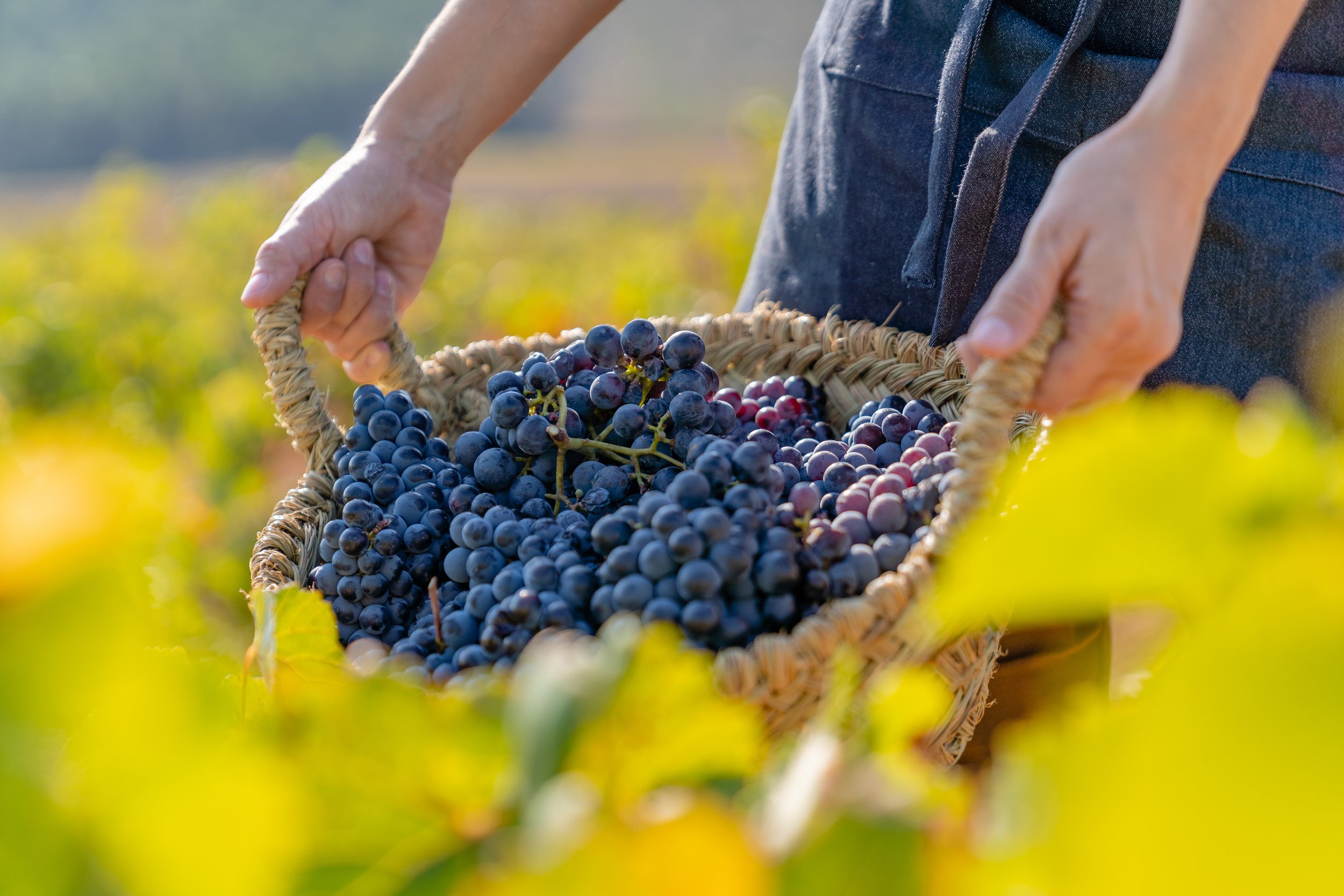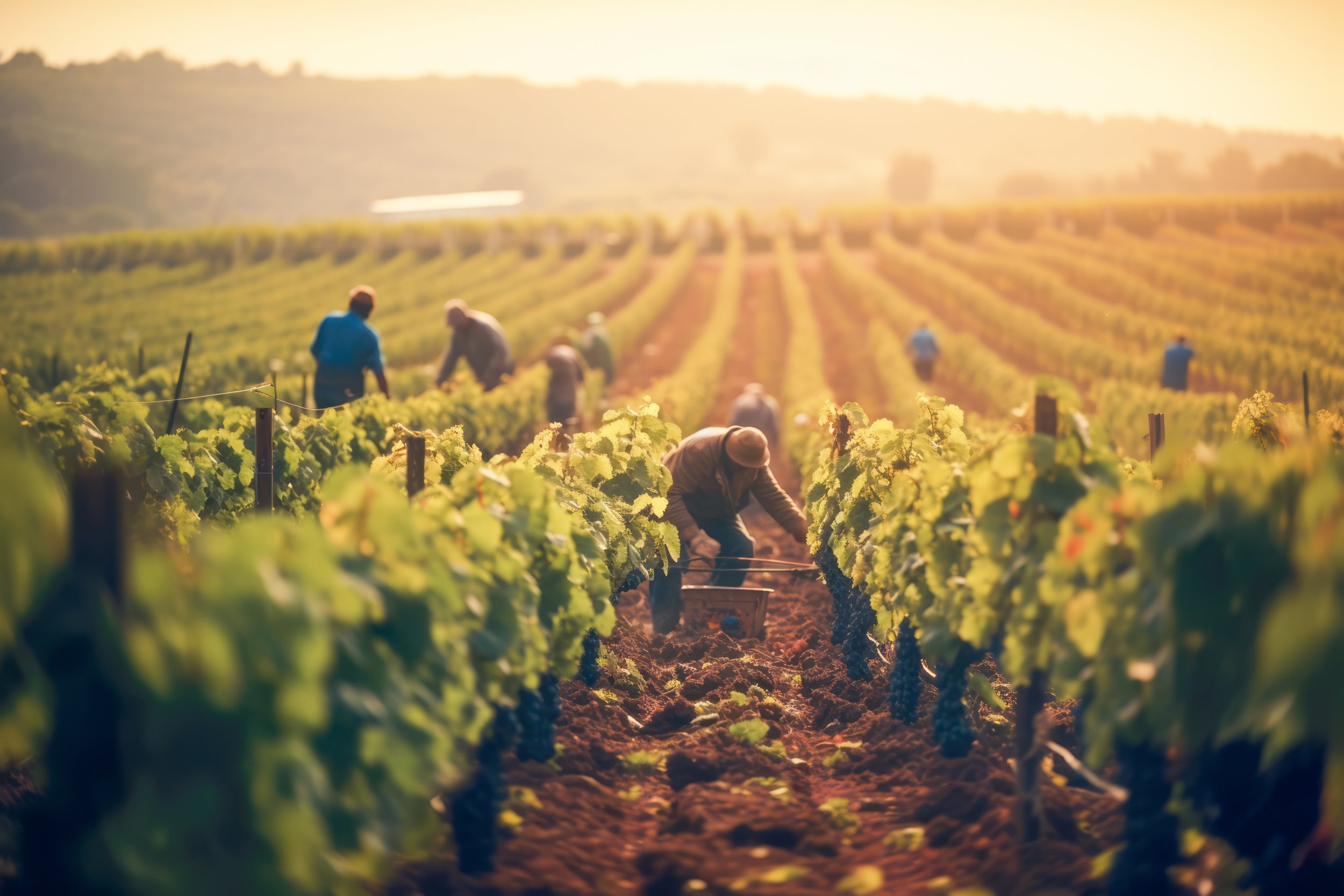Organic and Biodynamic Wines in Portugal
While Portugal has a rich history of traditional winemaking, the move towards organic and biodynamic practices is a relatively recent phenomenon. This shift can be traced back to the early 2000s when a handful of pioneering vineyards began to experiment with these methods. Over the past two decades, what started as a niche movement has gained considerable momentum, attracting both established producers and new entrants to the field.
It's worth noting that Portugal is not alone in this journey towards sustainability. The global wine industry is undergoing a similar transformation, influenced by a growing awareness of climate change and the potential health benefits of organic produce. However, Portugal's unique terroir and indigenous grape varieties offer a distinct advantage, allowing for the production of organic and biodynamic wines that are truly one-of-a-kind.
Harvest of organic wines
What Are Organic and Biodynamic Wines?
Organic Wines
In Portugal, the transition to organic winemaking is not merely a matter of avoiding synthetic inputs. Vineyards must undergo a rigorous certification process that typically spans three years. During this period, inspectors from accredited bodies like Sativa or the EU Organic Certification regularly visit the vineyards to ensure compliance with organic standards.
Organic wines have found a receptive audience both domestically and internationally. In particular, markets like the UK, Germany, and the United States have shown a keen interest in Portuguese organic wines, often associating them with higher quality and a more authentic taste experience.
Biodynamic Wines
Biodynamic winemaking in Portugal often involves the use of nine specific preparations, made from herbs, mineral substances, and animal manures, which are applied to the vineyards in homoeopathic quantities. These preparations are believed to enhance soil quality and stimulate plant growth, although the scientific evidence supporting these claims is still a subject of debate.
For a wine to be labelled as biodynamic in Portugal, it usually needs to be certified by Demeter, the international body for biodynamic agriculture. This certification ensures that the vineyard adheres to the stringent biodynamic principles, which go beyond merely avoiding synthetic chemicals.
It's important to understand that both organic and biodynamic winemaking are not just agricultural methods but also philosophies. Organic winemaking emphasises harmony with nature, aiming to create a balanced ecosystem where the vines are just one component. Biodynamic winemaking takes this a step further by viewing the vineyard as a microcosm that is influenced by broader cosmic forces.
The Growing Trend in Portugal
The adoption of organic and biodynamic practices is not uniform across Portugal's diverse wine regions. While areas like Alentejo have been quicker to embrace these methods, owing to a younger generation of winemakers and more arable land, traditional strongholds like Douro are also beginning to see a shift. Each region brings its unique challenges and advantages to organic and biodynamic winemaking, making the Portuguese landscape a fascinating case study in sustainable viticulture.
It's worth noting that younger generations, particularly Millennials and Gen Z, are at the forefront of driving demand for organic and biodynamic wines. These consumers are not only tech-savvy but also more informed about the environmental and health implications of their choices, thanks to the wealth of information available online.
While organic and biodynamic wines often come with a higher price tag, many consumers view this as a worthwhile investment. The premium market for these wines is expanding, not just in Portugal but globally, indicating a willingness to pay more for quality and sustainability.
Harvest field
Environmental Concerns
One of the most immediate benefits of organic and biodynamic farming is the improvement in soil health. These methods encourage a more diverse soil microbiome, which in turn supports a wider range of flora and fauna. This biodiversity is not only beneficial for the vineyards but also contributes to the overall ecological health of the region.
Organic and biodynamic practices often incorporate more efficient water management techniques, such as drip irrigation and rainwater harvesting. Given that parts of Portugal face water scarcity issues, especially during the summer months, these practices are not just environmentally sound but also economically prudent.
The Portuguese government offers various financial incentives to encourage the transition to organic and biodynamic farming. These range from tax breaks to grants that cover a portion of the costs involved in certification and soil improvement.
In addition to financial support, there are several educational programmes aimed at winemakers interested in organic and biodynamic methods. These programmes, often run in collaboration with agricultural colleges and wine associations, provide the necessary training and resources for vineyards to make a successful transition.
The government, along with industry bodies, is also investing in marketing initiatives to promote Portuguese organic and biodynamic wines. Special labels, participation in international wine fairs, and collaborations with foreign distributors are some of the strategies being employed to capture a larger share of the global market.
The Significance of the Trend
One of the most compelling reasons for producers to switch to organic or biodynamic methods is the potential for higher-quality grapes. Many vintners believe these practices allow for a purer expression of the terroir, resulting in wines with more character and complexity. Below you will find 6 organic and biodynamic wines for you to try.
Organic Wines
Quinta do Montalto Medieval de Ourem - An organic red wine from the Lisboa region. - Quinta do Montalto
Herdade de São Miguel Organic Red - A red wine from Alentejo, produced by Casa Relvas. - Casa Relvas
Aphros Loureiro - An organic white wine from the Vinho Verde region. - Aphros Wine
Photo: Aphros Loureiro
Biodynamic Wines
Casa de Mouraz Tinto - A red wine from the Dão region, produced using biodynamic methods. - Casa de Mouraz
Esporão Reserva Tinto - A biodynamic red wine from Alentejo. - Esporão
Herdade do Rocim Indígena - Indígena is the first organic wine produced by Herdade do Rocim. - Herdade do Rocim
Photo: Herdade do Rocim
These wines are excellent examples of the quality and diversity that organic and biodynamic methods can bring to Portuguese viticulture. Producers, consumers, and the industry at large stand to benefit from this shift towards more sustainable practices. It's a movement that aligns with global values of environmental stewardship and health, and one that could play a pivotal role in defining the future of Portuguese wine.



